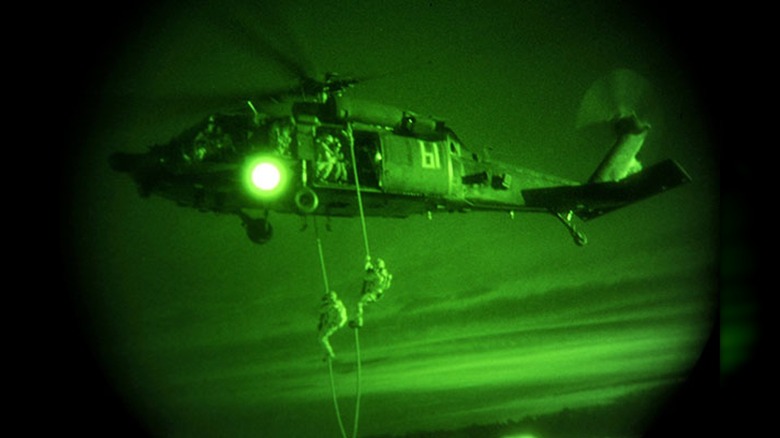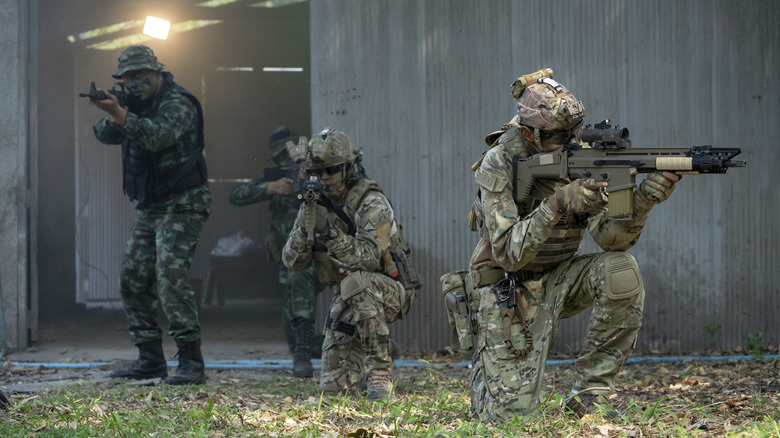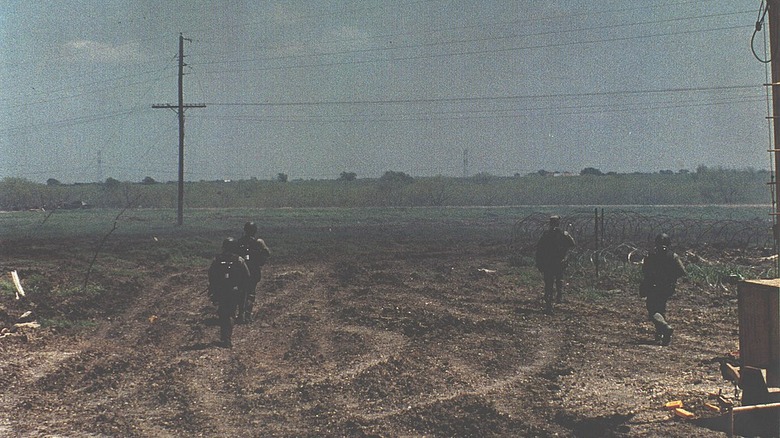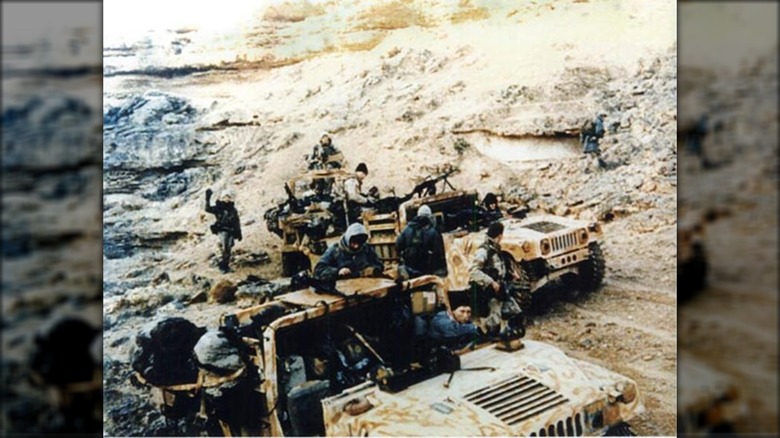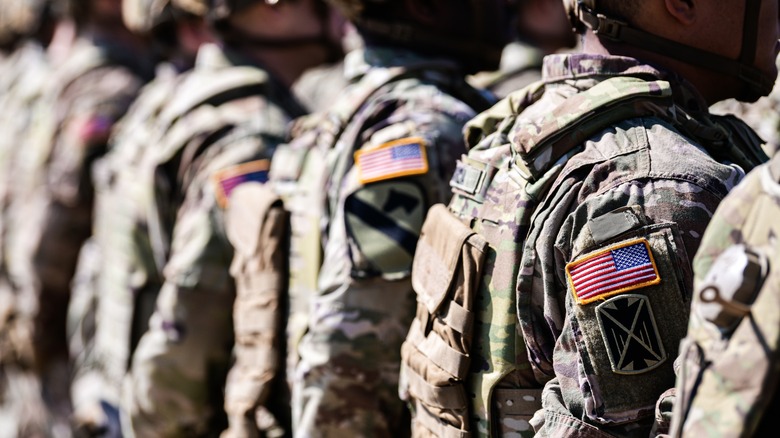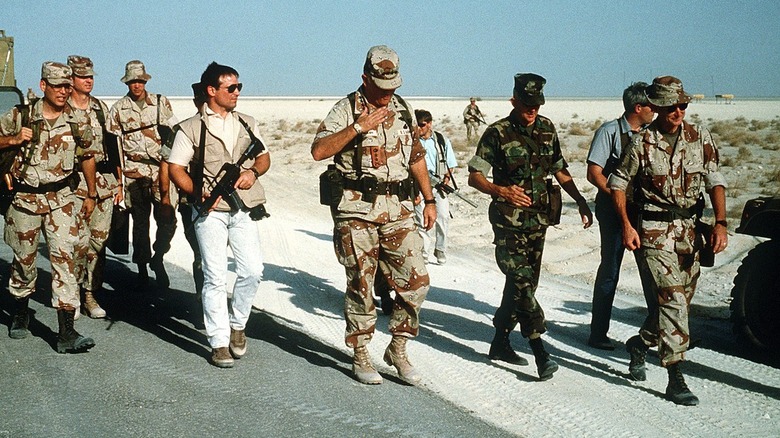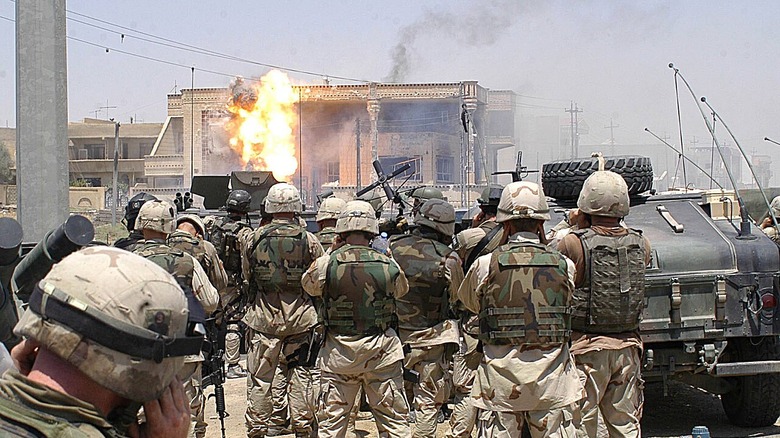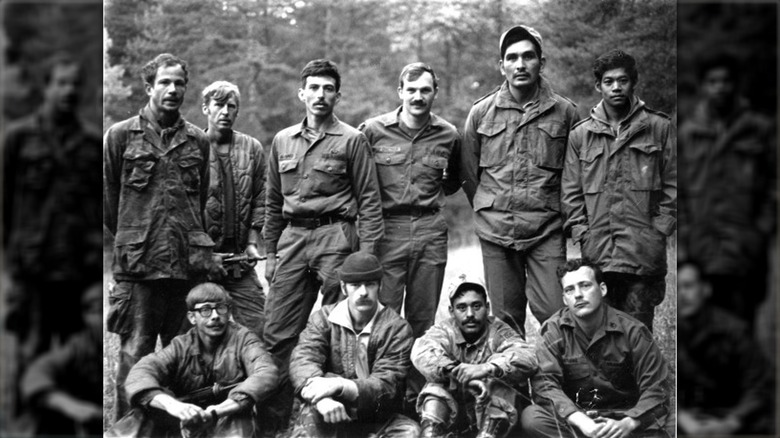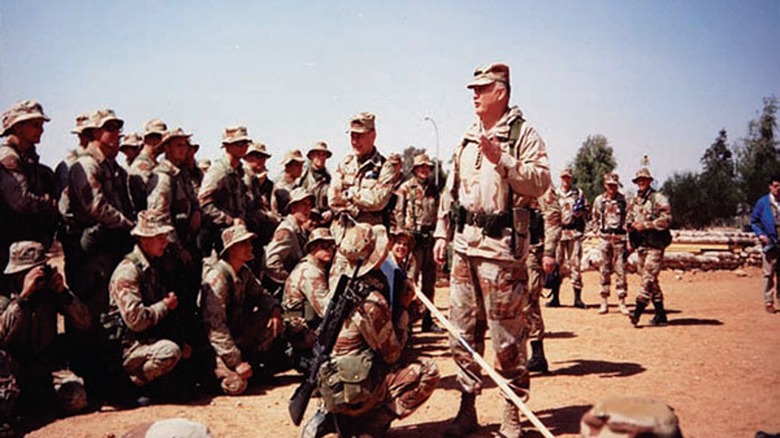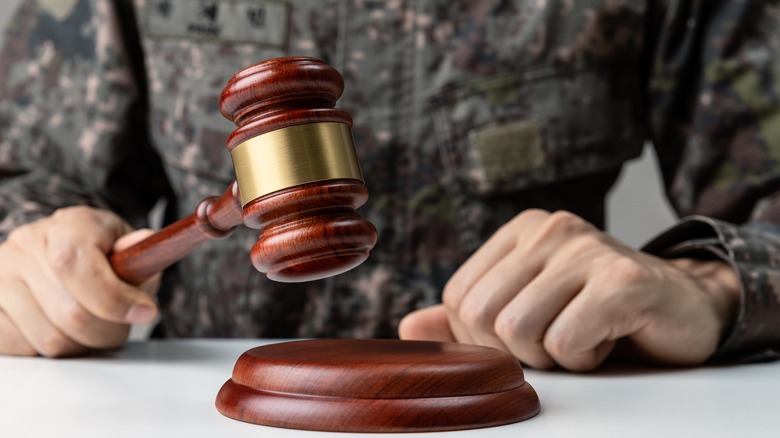Strict Rules Delta Force Has To Follow
There's a certain kind of mystique when it comes to the U.S. special operations forces, whether that be from questions surrounding the murky world of SEAL Team Six, the strange truth of the Intelligence Support Activity, or the mysteries of Delta Force. Many wonder exactly what it's like for these secretive branches of the U.S. military, responsible for the assassination of Osama bin Laden and the capture of Saddam Hussein. But despite having tracked down such high-profile targets, there's precious little information about the current inner workings of these units, and they're still shrouded in mystery.
While such secrecy has led to moments of controversy over the years for a number of various special operations forces units, it can still be said that Delta Force — formally established in 1977 by Charles Beckwith in response to increased terrorist activity at that time — has to follow at least some strict rules. In some ways, those rules are shared by all soldiers serving in the U.S. military, but in other ways, the rules are fairly unique, even coming as a surprise to Delta Force operators when they first join the unit. Here are a handful of those rules they have to follow.
Recruits need to be in peak physical and mental shape just to get in Delta Force
As one might expect of one of the most elite U.S. military groups, the requirements to be a part of Delta Force are incredibly strict. Just to be considered, interested recruits need to have already been a part of the military for two and a half years and reached a specific rank, have good standing when it comes to discipline, and be over 21 years of age.
Assuming those basic requirements are met, recruits are faced with grueling training, with the first stage — lasting about four weeks — being largely physical (though there are plenty of psychological evaluations, too). Feats of endurance, strength, and combat are all part of the deal, though the most notorious of those tests is also a navigational challenge, with candidates traveling 18 miles through rough and unfamiliar terrain, facing unknown weather conditions, and carrying 40 pounds on their back — all in the dead of night.
But things don't end there. Assuming those recruits make it to operator training, they're faced with a whole new set of challenges. Things like combat training still stick around, but they're joined by tradecraft and intelligence gathering, counterterrorism, protection tactics, and the general mental fortitude needed to always perform at peak levels and work together in any kind of high-stress situation.
Delta Force operators are expected to be 'quiet professionals'
The fact that secrecy is associated with Delta Force probably isn't too much of a surprise, but it's a rule that's become strangely complicated in recent years. Generally speaking, Delta Force operators are expected to say nothing about their work. Retired Army Colonel Ken Allard told The Washington Times that those working for Delta Force are "quiet professionals ... the quintessential shadow forces," adding that "Silence is security." That typically means that they put very little information about themselves into public spaces, the Internet and social media, included. At most, there might be a few old photos of themselves floating around, or maybe some contact information that's since proven out of date. But even when it comes to internal records, secrecy is one of their most important practices.
Speaking about his experiences, Eric Haney wrote in "Inside Delta Force" that operators were completely pulled from official systems used by the rest of the Army. Their names and records were wiped from conventional systems, as was the existence of Delta Force itself, which utilized a completely separate system. As he put it, "Upon assignment to Delta Force, we ceased to exist in the regular Army."
Strangely enough, Delta Force's commitment to secrecy has put it somewhat at odds with another arm of the special operations forces: SEAL Team Six. When the latter received heavy publicity following the last days of Osama bin Laden, Delta Force operators staunchly held to their culture of quiet secrecy instead.
Delta Force has strict rules of engagement
Being a part of a secretive unit within the U.S. special operations forces brings with it some especially high-stakes and bloody missions. Some observers of Delta Force have verified this in the most visceral way, going so far as to say, "On deployment, they literally go around blasting people's brains out ... They have zero remorse" (via Rolling Stone).
It is worth mentioning, though, that these aren't merciless killing sprees conducted under rules of engagement unique to Delta Force members. On the contrary, they're expected to follow the exact same rules as any other soldier on the battlefield or in hostile territory. In an interview, former Delta Force operator Brent Tucker explained that it's all about the assessment of risk. If an operator is directly threatened — such as an enemy holding a weapon in their face — then they're allowed to fight back. But even if they perceive a potential threat — say, thinking that an apparently unarmed individual might be about to carry out a dangerous plot — then they're also allowed to act, preemptively eliminating the threat.
Of course, the latter can get into some murky waters, and operators will be questioned as to why they leapt into action and be expected to be able to give detailed justifications for their decisions. If anyone is determined to be playing too fast and loose with the rules just for the sake of killing more people, then they won't be allowed to continue in Delta Force.
Delta Force operators can't rely on their old Army training
Many of the skills that Delta Force operators bring from the Army are vital to success in the special operations forces, so they aren't expected to discard everything that they had learned beforehand. As Eric Haney's "Inside Delta Force" details, the Army provides a lot of stability to those who join its ranks. During peacetime, training schedules are explicitly given to Army soldiers, detailing where they're supposed to be, what they're expected to do, who they would be training with, and even the types of meals they would be receiving that day. In a warzone, that is much the same, with soldiers told expressly how they are expected to act in given situations. For a lot of people, that regulation provides a fair bit of comfort.
But as Haney explains, Delta Force isn't anything like that — something made clear as early as recruitment and training. Trainees generally aren't told where they stand in comparison to their peers, and are often blind as to what location they will be arriving at next (even while riding on a truck and being driven to said location). And while some, like Haney, welcomed the spirit of the unknown, others weren't as keen, uncomfortable with the idea that they were completely ignorant of what they would be doing in the coming hours or days.
Delta Force always expects and prepares for the worst
Given that Delta Force handles high-priority and tense missions, one thing its operators are taught very early on is that they need to be able to improvise and adapt on the fly, no matter what. Above all else, they must always keep old, reliable Murphy's Law in mind.
This is drilled into Delta Force operators throughout their training. As Eric Haney describes in "Inside Delta Force," recruits were faced with a training situation: protect a U.S. ambassador (called the "Principal") to a foreign country. Sounds simple enough in theory, but in practice, that's not quite so. Haney explained that avoiding dangerous situations was always the best way forward, if not always the simplest to accomplish, but even in circumstances that seemed safe on the surface, anything could happen.
On the less life-threatening end, a flat tire could mess with scheduling, but on a more serious end, the Principal could be having a private dinner with acquaintances when rockets landed on the house and lit it ablaze. Or maybe a frustrated individual could try to attack the Principal in a public space. Perhaps the Principal found a gun pointed in his face by local authorities. Or maybe it could even be something without a violent motive — the Principal having a sudden heart attack, for example. All of those were real scenarios recruits were faced with, and Haney explained that it taught them one thing: "Always expect something bad to happen and be ready to act."
Delta Force constantly trains for wartime
Conventional military training is nothing to scoff at, but from the eyes of a special operations forces operator, typical Army training doesn't really cut it, should push come to shove.
As Eric Haney explains in "Inside Delta Force," the Army preaches the idea that it's best to "train the way you fight." However, that is rarely followed in practice, as conventional training in peacetime typically doesn't resemble wartime tactics. One example given by Haney is marksmanship: shooting using a sight is one skill, but shooting while running and looking at a target — rather than directly through the sight — is another. Most soldiers aren't trained to switch between the two, and the lack of that kind of training can hurt their ability on the battlefield.
Delta Force works differently. As Haney states: "In Delta, the only unit in the entire Army on continual war footing, we didn't have the luxury of wasted training time." That meant learning how to shoot from any position and how to avoid accidental friendly fire (something that would actually stop an entire training session and require the operator in question to explain what they did wrong — and one of the worst possible mistakes). But it also meant a surprise lesson where they played the part of confused hostages while their instructors carried out the exercise themselves. All while using live ammunition. A terrifying thought to any civilian, but one that was even more unexpected to the new operators.
Delta Force has relaxed grooming standards
When picturing modern-day soldiers, there's a good chance that most of us have a specific image in mind. And that's for good reason; though standards have changed and loosened in recent years, there are still some fairly specific guidelines that all soldiers have to follow. Hair has to be pinned in one of only a few ways and must be of natural colors, makeup has to be of similarly light colors, only women are allowed simple earrings, and, of course, there's the obligatory uniform.
But that's not true when it comes to Delta Force. Unlike other military units, Delta Force operators are allowed a much more relaxed grooming policy — longer hair, bushier beards, and sometimes even civilian clothing instead of military uniforms. In fact, they're encouraged to follow that policy, since if operators don't look like they are part of the military, it's far easier for them to go undercover and pass as civilians. It has a practical advantage too, as if they need to adopt a more military appearance, it's much less hassle to get a haircut than to do the opposite. In some cases, operators have even used their long facial hair in order to cross cultural divides and build friendships with authorities in foreign countries.
They're expected to get along with their fellow operators
Camaraderie is the kind of thing that you'd always hope to have when you've got a bunch of people working in a closely knit group, especially when that group is also dealing with life-and-death situations. But because compatibility is something that can't really be forced, it also doesn't seem like the kind of thing that could somehow become a rule. In Delta Force, that's not exactly the case, though.
As Eric Haney explains in his book "Inside Delta Force," one group of men training together with the hopes of being recruited to Delta Force didn't always get along. Sometimes, that just meant disliking others for no real reason beyond a gut feeling, or it could mean that there were problems that just arose naturally — the expected result of people living together for an extended period and their differences clashing on occasion. He explained that they always solved those problems eventually and became a close-knit unit, even if the process wasn't always pretty.
That said, there is always one specific rule that they are not allowed to break, under any circumstances: "Never lay an angry hand on a brother operator," no matter how heated things get. If an operator breaks that rule, no leniency can be expected. Haney goes on to say that in his experience, punishment was immediate expulsion from Delta Force — something that he knew had happened only once in the unit's long history.
Delta Force has to be civil with the rest of the military
The U.S. special operations forces might seem to operate in their own insulated world, as groups of soldiers that don't interact much with the rest of the military. After all, while SEAL Team Six has a few odd rules of its own, its operators do typically go on their missions alone. That approach has won them significant praise, but it's worth noting that Delta Force doesn't operate like that at all.
In contrast, Delta Force was always designed to work with the rest of the military, rather than apart from it. That has allowed it to actually take on no small number of missions over the years, getting more done and doing so in a far quieter fashion. A specific example can actually be found in one of Delta Force's best-known missions: ending the evils of Saddam Hussein in 2003. While it was a Delta Force mission, the actual legwork required both special operations forces operators and conventional soldiers, working side by side.
This mode of operation has meant that Delta Force has been able to cultivate an efficiency and longevity that Army officials seem rather proud of. In comparing the two special operations forces units, retired colonel Kent Allard said, "The SEALs are short-term killers. Delta has a lot of other missions. It shows how well-integrated the Delta Force guys are with the conventional forces" (via The Washington Times).
There's reason to doubt Delta Force's strict rules, though
On the surface, it might seem like Delta Force operates by strict rules, held closely to its codes of conduct. But there are some stories that will leave you wondering whether the untold truth of Delta Force is something much darker.
One specific incident took place in 2016, in which newly appointed lieutenant Erin Scanlon received a posting in Fort Bragg. Scanlon was shortly invited to an event hosted by special operations forces operators, including one Cristobal Lopez Vallejo, a highly decorated Delta Force operator who flaunted his name and reputation. Scanlon alleged that Vallejo raped her later that night, and she tried to take the case to court. However, Scanlon said she was roadblocked at every turn. Her military-appointed lawyers were constantly switched around and lacked knowledge of the situation, she was manipulated into changing venue to a military court-martial — where conviction rates for rape are known to be lower — where she was perpetually kept out of the proceedings and largely uninformed, and the tapes of the trial were later destroyed. Despite evidence supporting Scanlon's claims, the defense won their case — Vallejo was allowed to go free — by ignoring the lack of credibility of some of their own witnesses and engaging in other tactics that were, if not illegal, still unethical.
In short, Scanlon has had reason to believe that Vallejo's career with Delta Force was what saved him and ultimately buried her tragic story. Not exactly the shining reputation the unit necessarily projects otherwise.
If you or anyone you know has been a victim of sexual assault, help is available. Visit the Rape, Abuse & Incest National Network website or contact RAINN's National Helpline at 1-800-656-HOPE (4673).
